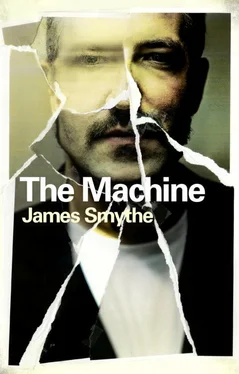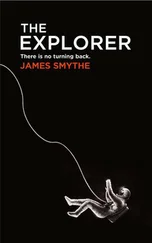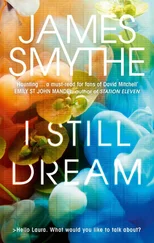Beth. They shake hands.
Beth spends the rest of her lunch walking the Black Pitch. It’s what the school unofficially calls the main playground: a patchwork of tarmacs, laid at different times to cover holes and cracks that could prove near-fatal, then covered with a thick coat of gravel from end to end. The noise of the children’s shoes on the gravel is ever present: a scraping, thin and frantic. The pitch needs to be watched at all times. It’s a rare lunch hour that one of the kids doesn’t fall and hurt themselves. Beth walks around it by herself, because when it rains like this, the pitch is empty: none of the kids want to brave it. They hang around the grassy fields or the slick tarmac at the back of the art block, under whatever cover and overhangs they can find. She can’t hear anything over the sound of the rain on her umbrella. It’s quite peaceful, she thinks, watching the water hit the gravel as it does, almost nudging it around to make immediate puddles. It’s relaxing. As the break comes to a close she stands in the central doorway to the Black Pitch and waves the children in. They’re all drenched, which is a hazard. The school used to trap them inside when it rained, to stop any chance of them getting sick. The kids used to be more trouble than that was worth. Now they get drenched, and they ride through the final two lessons of the day in damp clothes. They’re always too exhausted to cause any trouble at least, those afternoons.
When they’re all inside Beth still stands there, in the door frame. She loves the smell.
Petrichor, says Laura from behind her. That’s what you call the smell of rain on hot ground.
Thanks, Beth says. Good word.
No problem.
Did they go all right? Beth asks, catching her just as she’s off to her next class.
The bell rings over her reply, which she repeats. They went fine, yeah. Better bunch of kids than in many places.
Beth thinks that might be a compliment. Her class, a year-seven one, doesn’t listen to her telling them about some semi-tragic novel where an Inuit child befriends a husky that saves its life and, tragically, inevitably, dies.
Beth can’t sleep because of the rain. It’s so heavy that it sounds unholy: the windows shaking, the beating of it against the ground outside. Looking down from her bedroom window to the Grasslands she can see that they’ve become a slop, as the run-off from the hard ground has caused the water to accumulate there. It’s puddled around the base of the building – she can lean down and see it, like a trench, and there are things floating in it but she can’t see what they are from here, bobbing like dark rotting buoys – because the ground is too hard to take it in. It’s easier to watch it than to sleep, so Beth slides open her window and leans out. It’s coming straight down, no wind pushing it in any direction. She can lean on the sill and not get even slightly wet, which she does: sitting on the edge of the bed and watching it fall. The cats are conspicuous by their absence. She wonders where they go when it rains like this. If they’re young enough to not remember when it rained with any real regularity, and if they don’t know what it is, it must terrify them. She remembers being a child and having a small dog, and the first winter it snowed since they got it. Taking the dog out into it and trudging through the foot of whiteness that covered their streets that first morning, and watching the dog licking at it, then jumping through it: trying to make it over the mounds but failing, and ending up leaving pits where its entire body landed over and over again. How it pissed into it, and the cave that the hot urine made, and how that cave made the overlying snow crumble. How she notices that cause and effect, dragging the dog to piles of snow against walls to get it to wee, to make the snow collapse.
When she’s done with the window she leaves it open and walks around the flat. She sits in the living room in front of the television, nervous. She checks her bank accounts, which have been all but cleared out by her purchasing the Machine. She’s got an email from the French seller. He’s ambiguous in the language he uses, but he wants to make sure that it got there in one piece, and that it works. She doesn’t know why he cares: probably because he’d likely get in more trouble for selling it than she would for buying it, and if it was broken she would be liable to kick up a fuss. She replies: Everything seems to be fine, and the equipment seems to function. I’m very grateful for all your help. She presses send, and she’s barely had time to think before a reply comes.
No problem, it says. It offers her help if she needs it, tells her to email that address. She doesn’t reply to this one. She assumes that that’s it, the last contact that she’ll have with him. She Googles Vic’s name, just to see if there’s anything new, but there’s nothing immediate. There’s a lot of articles that mention him as part of some group litigation, and a few people who have studied him, covered him as part of a thesis. Occasionally an article will mention Beth as well: it will say that he was only recently married when he went to war, and that the treatment robbed a wife of her husband, left her practically bereaved only a couple of years past their beautiful union. Purple prose to describe something that was far more simple and crude than it appeared. When it had actually been a lump of shrapnel from an improvised, home-made bomb that robbed her. When she heard that he had been injured – a telephone call from a man whose name she didn’t even remember, frantic and desperate where she had assumed that army calls came through measured and calm – she prayed for him to survive. She said, through her atheism, that she wanted nothing more than for him to survive.
Whatever happens, that’s all that I want, she said, out loud, to the darkness of her bedroom as she tried to sleep that night. Now, she remembers that night, because – quite deliberately – she never prays. This has been done by her, not some cruel deity. It was an unfair trade-off, to give him his life and then curse him with the dreams that it did, only to rob his life from him again, in all essence. Beth shuts the laptop and walks to the fridge. She takes milk out and drinks from the bottle, standing with the door open, letting the chill run over her body. She can’t stop thinking about Vic, so she goes to the spare bedroom. This, in here now, contains a part of him.
You’re still here then, she says. She turns the Machine on and presses her hand, all of it, palm fully spread, onto the screen. The whirr, the hum. The familiar warmth of the screen as she leaves her hand there, and the print that’s left when she peels it away. The start-up tones ring out and she sees the menu there. She chooses to play back a recording. There’s a list of them all, each with a date stamp and time count next to it. At the bottom of the list is a total of everything. Just shy of 270 hours of recordings. It’s implausible, she thinks, until she remembers that they took it out of him in hour-long chunks, broken down into only a few sessions a week. She can’t remember how long it took, not really. How long they lived with Vic having his episodes, and with Beth pretending that it was all right.
She picks one, at random. Vic’s voice is first.
I know how this goes, he says. He sounds sick, Beth thinks: like there’s a scratch in his throat. He says, What do you want me to talk about, Robert?
I’d like you to tell me your name, like always, the doctor says.
Victor McAdams.
Tell me some other things about yourself, Victor, the doctor says. There’s a pause, then he speaks again. Where do you live, for example?
London.
Oh, whereabouts?
Ealing.
Читать дальше
Конец ознакомительного отрывка
Купить книгу










